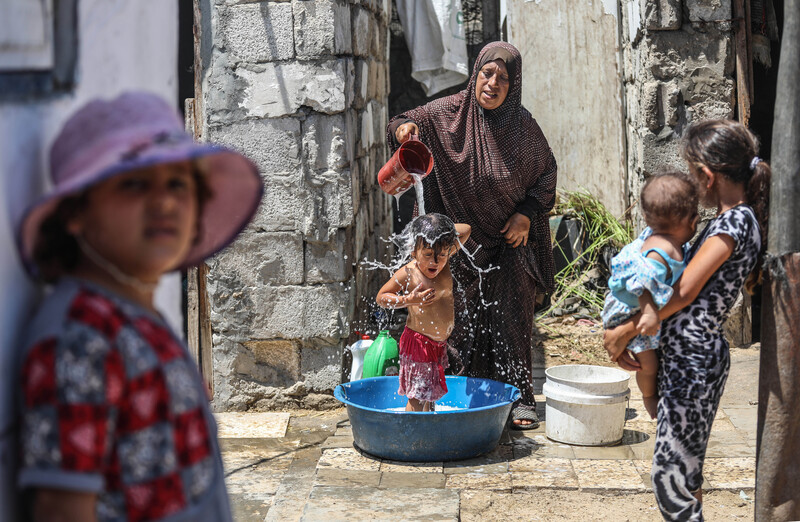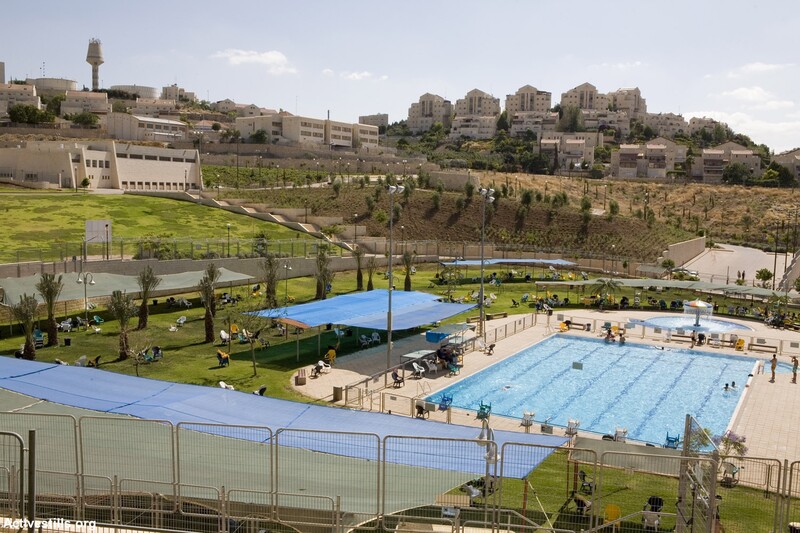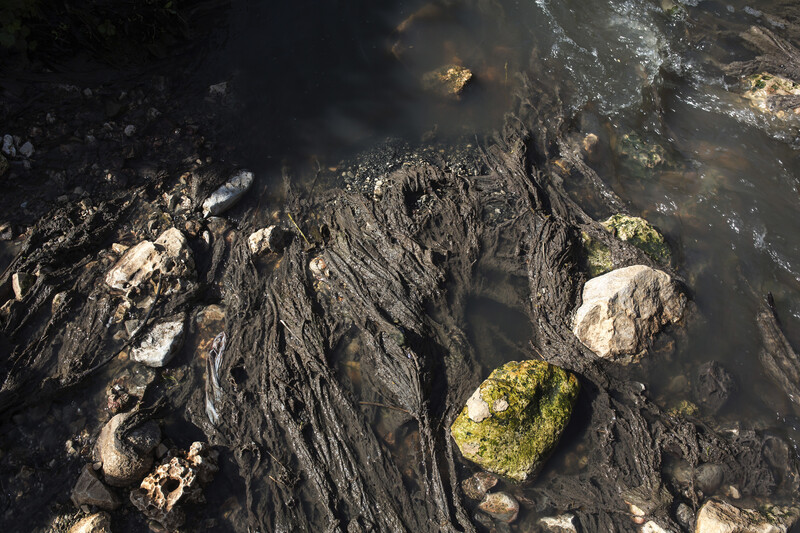The Electronic Intifada 13 August 2021

A Palestinian woman bathes a child outside their home in Nahr al-Bared refugee camp in Khan Younis, southern Gaza Strip, August 2019.
ActiveStillsIsrael is finding a new opportunity for “climate diplomacy” following a foreboding new report published this week by the Intergovernmental Panel on Climate Change, a scientific group assembled by the UN.
This “diplomacy” involves Israel greenwashing its oppression of the Palestinians and bolstering its international reputation by promoting the civilian application of technologies developed in the context of military occupation and colonization.
The IPCC report – which the UN secretary-general called “code red for humanity” – states that devastating impacts of human-caused climate change are locked in, but there still remains a narrow window to avoid the worst possible outcomes.
“Many of the changes observed in the climate are unprecedented in thousands, if not hundreds of thousands of years, and some of the changes already set in motion – such as continued sea level rise – are irreversible over hundreds to thousands of years,” according to the authors of the report.
“However, strong and sustained reductions in emissions of carbon dioxide and other greenhouse gases would limit climate change. While benefits for air quality would come quickly, it could take 20-30 years to see global temperatures stabilize,” the authors add.
The IPCC unequivocally attributes with a broad brush “the role of human influence on the climate system,” though the US alone is responsible for 25 percent of historical carbon dioxide emissions.
By contrast, the People’s Agreement of Cochabamba, emerging from the 2010 conference in Brazil held in the wake of the failed Copenhagen climate negotiations, points to a more specific cause of the climate catastrophe.
“The corporations and governments of the so-called ‘developed’ countries, in complicity with a segment of the scientific community, have led us to discuss climate change as a problem limited to the rise in temperature without questioning the cause, which is the capitalist system,” the agreement states.
“Capitalism requires a powerful military industry for its processes of accumulation and imposition of control over territories and natural resources, suppressing the resistance of the peoples,” the agreement adds. “It is an imperialist system of colonization of the planet.”
The Cochabamba document asserts that “humanity confronts a great dilemma: to continue on the path of capitalism, depredation and death, or to choose the path of harmony with nature and respect for life.”
Supposedly “green” technology developed through the exploitation and repression of colonized peoples, like that offered by Israel, is clearly a continuation of the first path.
“Israeli experience and knowledge can help countries around the world,” Alon Ushpiz, the Israeli foreign ministry’s director, said on Monday.
Ushpiz pointed to “the fields of water technologies and seawater desalination, drought-resistant agriculture and climate change, renewable energies and energy storage, development of animal protein substitutes, reforestation and other areas.”
The Times of Israel reported that the foreign ministry would “advance ‘climate diplomacy’ ” by “attending international events on climate issues and promoting Israeli technologies that offer solutions.”
Sanitized version of repressive tech
Research by the watchdog Who Profits demonstrates how seemingly benign “green” technology is developed in the context of Israel’s occupation of Palestinian and Syrian territory and exported abroad.
This civilian application allows Israeli military companies to promote “a sanitized version of their repressive technologies” as tools to combat climate change and world hunger.
Israeli agritech companies, for example, “develop and market smart irrigation systems, crop protection solutions and specialty fertilizers to farmers across the world, raking in billions of dollars in annual sales,” Who Profits states.
This industry contributes to agriculture in West Bank and Golan Heights settlements at the expense of those territories’ respective Palestinian and Syrian communities, who are deprived by Israel of the use of their land and water.

A swimming pool in a West Bank settlement, June 2010.
ActiveStillsPrevented from cultivating their land and thus deprived of economic sovereignty, many Palestinians in the West Bank are forced to find jobs in settlement agriculture, “often under deeply exploitative conditions,” as Who Profits notes.
Meanwhile, in the Golan Heights, Syrian territory occupied by Israel since 1967, settlement agriculture entrenches Israel’s presence on the land and harms the local Syrian economy.
Israel has even weaponized agritech against Gaza by using herbicides to damage and destroy Palestinian crops in the perimeter area, posing “a potential threat to the right to life as it directly undermines food security and health of the civilian population in Gaza,” the watchdog states.
Agritech firms “benefit from the commercialization of Israeli military knowledge” developed in the context of the occupation, according to Who Profits.
“Prolonged military occupation is the driving engine behind a prolific and highly profitable defense industry, resulting in a symbiotic relationship between the private sector and the state military apparatus,” the watchdog adds.
The civilian agritech sector benefits from Israeli government research and development subsidies in the West Bank and Golan Heights, which serve as a testing ground for developing products and technologies.
Palestinian agritech destroyed
At the same time, Israel destroys Palestinian agritech projects in Gaza and prevents them from being rebuilt.
A hydroponic greenhouse in Beit Lahiya, northern Gaza, that maximizes land use while reducing water consumption “is considered one of the most successful agricultural technology projects” in the territory, according to Gisha, an Israeli human rights group.
The greenhouse was hit during Israeli bombing and shelling in May, destroying crops, infrastructure and equipment.
The future of the greenhouse, founded in 2019 by Abdallah Abu Halima, and its 11 workers, is uncertain.

A Palestinian woman inspects the damage to her hydroponics greenhouse that was destroyed in Israeli airstrikes, Beit Lahiya, June 2021.
APA imagesRebuilding housing was prioritized after Israel’s destructive military offensive in Gaza in 2014, with entrepreneurs and farmers like Abu Halima receiving no compensation. That will likely be the case after Israel’s rampage in Gaza earlier this year.
Meanwhile, Israel severely restricts imports to Gaza as part of its tightened blockade imposed on the territory since 2007.
Regarding Abu Halima’s greenhouse, “the plastic containers used to grow the plants and the pumps used to water them are not available in Gaza, and neither are fertilizers, which are heavily restricted if not blocked entirely by Israel,” Gisha states.
Gaza water crisis
Israel controls all water access and use throughout historic Palestine to the benefit of Israeli Jews and to the detriment of Palestinians and neighboring Jordan.
Israel has destroyed and damaged water, sanitation and hygiene infrastructure during its repeated attacks on Gaza.
Nearly 300 water, sanitation and hygiene facilities were damaged or destroyed during Israel’s offensive in May, “including water wells, water pumping stations and distribution networks,” according to the UN monitoring group OCHA.
Maher al-Najjar, the deputy director of a water utility in Gaza, told Haaretz, an Israeli newspaper, that due to damaged infrastructure, domestic consumption of water per person has dropped from around 80 liters per day before the May escalation to 50 to 60 liters per day.
“The quality of the water has also been damaged, with a significant increase in the level of chlorides,” Haaretz adds.
Urgently needed repairs have been delayed because Israel fully controls imports via the Gaza Reconstruction Mechanism, by which it can ban the entry of goods that it claims may have a military application.
Lacking adequate sources of water, there is excess pumping from Gaza’s aquifer, causing “seawater to penetrate into the groundwater and [causing] the inward collapse of soil.”
A plan to expand desalination facilities was abandoned last year “due to a shortage of building materials and because Israel still hasn’t granted entry visas to seven engineers from Turkey who are supposed to oversee the project,” Haaretz adds.
Israel has prevented the import of some 5,000 items necessary to repair damage and to perform regular maintenance to Gaza’s water and sewage system since May.
There is “an increased danger of flooding and a risk of building collapse in the winter” if this work isn’t completed on time, according to Haaretz, citing al-Najjar.
“Two faces” to Israel’s water story
Israel doesn’t wish to draw attention to the water crisis it has made in Gaza. Instead, it promotes its water and agriculture tech as solutions to the great challenges facing humanity.
But Israel’s water story has “two faces,” as Nomvula Mokonyane, then South Africa’s minister of water and sanitation, stated in 2017.
Israel markets its water expertise internationally but uses it as a weapon of war against the Palestinians.
“Skewed distribution” leaves Palestinians in the West Bank with 73 liters per person per day, Mokonyane said, compared to 240-300 liters for Israelis.
The World Health Organization recommends 100 liters of water per person per day.

A polluted water stream coming from Ariel settlement and the Barqan settlement industrial zone near the Palestinian village of Bruqin in the West Bank, February 2019.
ActiveStillsThe South African minister observed that hundreds of Palestinian communities in the occupied West Bank and Gaza Strip are not connected to water supplies.
Mekorot, Israel’s national water company, shuts down the supply of water to Palestinians, who are in turn forced to buy from the company.
One water expert working in Palestine has described the situation as “hydro-apartheid.”
Al-Haq, a Palestinian human rights group, states that the diversion and use of Palestinian water resources for Israel’s benefit may amount to “the crime of pillage.”
Life-and-death issue
Israel’s recent killing of a water engineer in the northern West Bank town of Beita is a harrowing example of how its colonial control over Palestinian natural resources is a matter of life and death.
Israeli soldiers shot Shadi al-Shurafa as he stood next to Beita’s main water valves while holding a wrench on the evening of 27 July.
The slain man’s brother told Haaretz that al-Shurafa was frequently summoned at all hours to check on the village’s water system.
Water supply to Beita had stopped on the night that he was killed. “The system is very poor and the supply is frequently disrupted,” according to Haaretz.
And why were the soldiers who killed the Palestinian water engineer there in the first place? For the sole purpose of protecting nearby Israeli settlements built in violation of international law.
Israeli colonization, occupation and the civilian technology it exports abroad are deeply intertwined.
The Cochabamba People’s Agreement denounces “the way in which the capitalist model imposes mega-infrastructure projects and invades territories with extractive projects, water privatization and militarized territories, expelling Indigenous peoples from their lands, inhibiting food sovereignty and deepening socio-environmental crisis.”
What the “Israeli experience” truly illustrates is that decarbonization must be coupled with decolonization. Apartheid technology is not the solution to a livable present or future.
Maureen Clare Murphy is senior editor of The Electronic Intifada.





